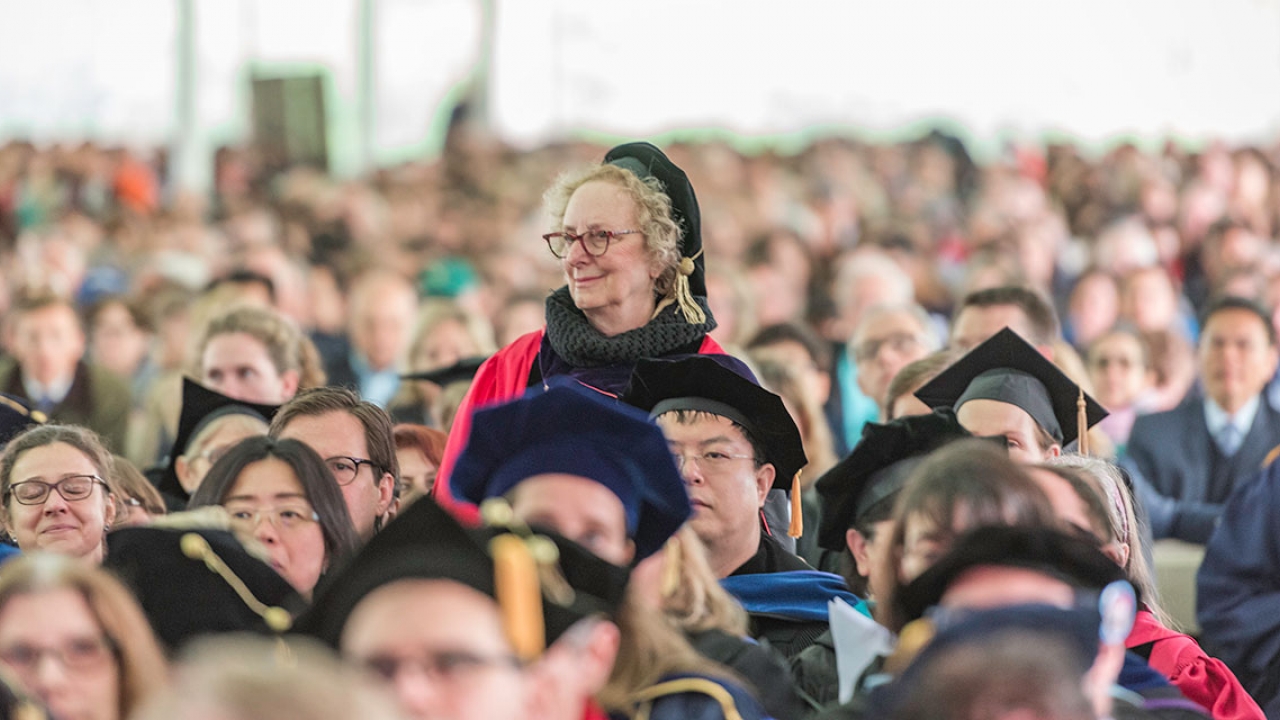The Far-Reaching Impact of a Wellesley Historian’s Study of Medical Research Ethics

Susan M. Reverby, professor emerita of women’s and gender studies, has studied medicine and nursing from a historian’s perspective during an academic journey that has taken her to many places, perhaps most notably Tuskegee, Ala., where she investigated the U.S. Public Health Service’s infamous syphilis study.
The American Association for the History of Medicine recently honored Reverby with a session on her scholarship and its impact on the history of medicine, public health, and nursing.
Reverby helped spearhead the women’s and gender studies program at Wellesley as she was its first faculty hire (half time, one year) in 1982, and she also served the College in several other roles over the years. She retired in December 2016.
Describing herself as a historian driven by her social values, Reverby said, “I’m the daughter of a physician and biologist but I’m also a child of the 1960s with a healthy dose of skepticism about those in power and a refusal to believe that they always know what is best. I know too much about American racism, sexism, and class power to pretend it doesn’t affect and shape everything in our lives.”
Reverby’s first passion was labor history. She earned a B.S. at Cornell University’s School of Industrial and Labor Relations and studied at the London School of Economics, then earned her master’s degree at New York University.
During the 1960s and ’70s, her interests mirrored the issues of the times. She worked in an abortion clinic in New York and wrote articles about the politics of women health workers and women’s health for a radical health think tank.
In the mid-1970s, Reverby and two other historians edited a book titled America’s Working Women: A Documentary History (1976) that was a first in the field. Later she wrote the prize-winning Ordered to Care: The Dilemma of American Nursing (1987), a revision of her doctoral dissertation from Boston University’s American Studies Program.
In the 1980s, Reverby helped create the American Association for the History of Nursing while continuing her research and writing.
With the nursing profession on her radar, Reverby turned her focus to an African American woman named Eunice Verdell Rivers Laurie who worked as a coordinator for the Tuskegee syphilis study.
“I thought I would write a book about Laurie, but there wasn’t enough material,” said Reverby. “So it turned out to be a two decades long obsession with Tuskegee and its history.”
Reverby brought her training as a historian to bear as she plumbed volumes of research data from the experiments. “While I respect data, facts, and science, I am well aware of how they are constructed and often what is ignored,” she said. “My job as a historian is to bring context and insight into the past.”
She worked on two groundbreaking books about the unethical research conducted on the men in the Tuskegee study. The first, which she edited, was Tuskegee’s Truth: Rethinking the Tuskegee Syphilis Study (2000).
Her second book, Examining Tuskegee: The Infamous Syphilis Study and Its Legacy (2009), won the Ralph Waldo Emerson Prize from national Phi Beta Kappa for the best book in the humanities and the Sulzby Prize for best book in Alabama history from the Alabama History Association.
Reverby was also a member of the Legacy Committee, whose work led President Bill Clinton to offer an apology in 1997 to the surviving Tuskegee men and their families on behalf of the nation. Reverby was at the White House to watch this happen.
While conducting her research, Reverby uncovered unpublished papers revealing that in the mid-1940s U.S. scientists had also infected hundreds of Guatemalan men and women sex workers, prisoners, soldiers, and mental hospital patients with syphilis and gonorrhea. With her connections to the C.D.C., the findings prompted an apology to the people of Guatemala from the U.S. Secretary of State and Secretary of Health and Human Services.
Though she has retired from Wellesley, Reverby plans to remain active in the field of medical history, with a fellowship at Harvard’s history department this coming academic year. She is currently working on a biography of a physician and radical activist who helped make AIDS medication available to millions of people in the world’s poorest countries, and was also held as a “political prisoner” of the United States.
Elena Creef, chair of the Department of Women’s and Gender Studies at Wellesley, credited Reverby with helping to lay a foundation for the program. “Susan Reverby is not only the foundational faculty member of Women's and Gender Studies at Wellesley College, but she has embodied over her three decades of teaching and service what we think of as our department's core principles,” she said. “Through her leadership, her example of striving for nothing less than excellence, and her great sense of humor and compassion, Susan's legacy is that she built one of the finest liberal arts women's and gender studies departments in the country.”



